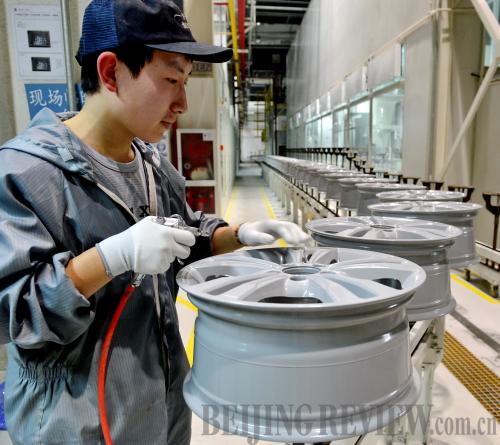|
 |
|
AN EMERGING WHEEL EMPIRE: A worker at a production line of CITIC Dicastal Wheel Manufacturing Co. Ltd. The company, based in Qinhuangdao, north China's Hebei Province, is a world leading manufacturer of aluminium wheels, with 10 billion yuan ($1.61 billion) in sales revenue in 2012 (YANG SHIYAO) |
Slower Expansion
Business activities in both manufacturing and non-manufacturing sectors continued to expand in February, but at slower paces. Experts attributed the slowdown to the Spring Festival holiday (February 9-15), an occasion for family reunions when much of the country is off work.
The purchasing managers' index (PMI) for the manufacturing sector fell for a second month to 50.1 percent in February from 50.4 percent in January, according to the China Federation of Logistics and Purchasing (CFLP).
The PMI stayed above 50 percent for the fifth consecutive month, indicating continued expansion, said the CFLP. A reading above 50 percent indicates expansion, while a reading below 50 percent indicates contraction.
The CFLP said China's industrial production is generally steady at present and companies are relatively optimistic about their future economic prospects.
The PMI of the non-manufacturing sector was 54.5 percent in February, down 1.7 percentage points from January. The figure marked the first decline since October, said the CFLP.
Lawsuit Accepted
China's Sany Group Co. Ltd. said on March 2 that its core request in the lawsuit against U.S. President Barack Obama has been accepted.
Sany's U.S.-based subsidiary Ralls Corp. last year filed a complaint against Obama and the Committee on Foreign Investment in the United States (CFIUS) for blocking its ownership of four wind farms in Oregon.
The core request, which maintains that the president's order deprived Ralls of its legal property without executing legal procedures, was accepted by the U.S. District Court in Washington, D.C. according to a preliminary ruling issued on February 22, said Wu Jialiang, CEO of Ralls Corp.
Wu said the Sany case provides a model for other Chinese investors to protect their legitimate rights via legal means when facing similar resistance from the CFIUS.
The case is subject to further trial after both sides submit more documentation to defend their claims.
Eyeing Commercial Space Launch
China plans to increase its share in the global commercial space launch market to 15 percent by 2020 from 3 percent at present.
The China Academy of Launch Vehicle Technology will explore new business models of in-orbit delivery and space-and-ground integration, Liang Xiaohong, the academy's deputy head, told Xinhua News Agency.
The academy is working to establish strategic alliances with other major launch service providers in the world, and set up strategic cooperation relations with major satellite manufacturers, he said. The academy is also striving to set up a management system in line with the market and international standards.
The cost advantage of Chinese rockets is not as prominent as before due to the rise of the Japanese and Indian aerospace industries and private aerospace enterprises from the United States and Europe, he said.
The China Academy of Launch Vehicle Technology is the premier space launch vehicle manufacturer in China and one of the major launch service providers in the world.
| 